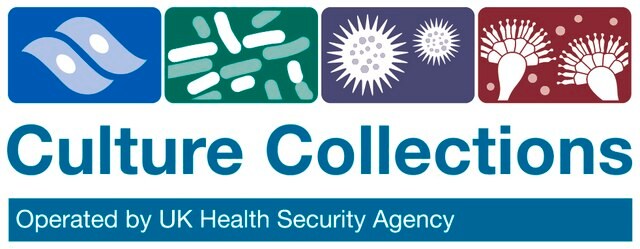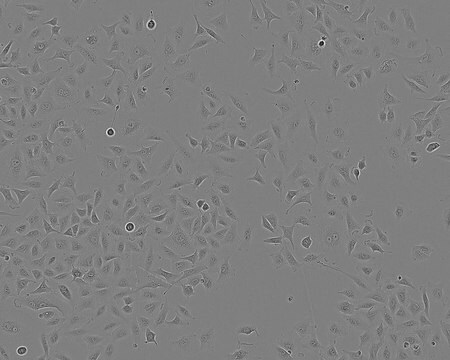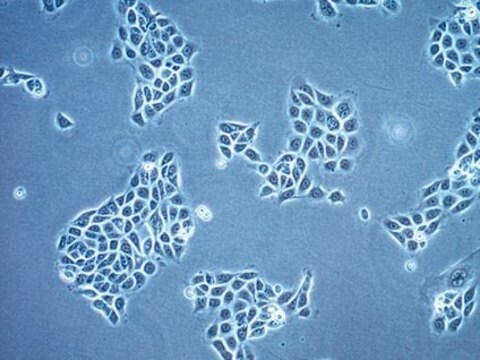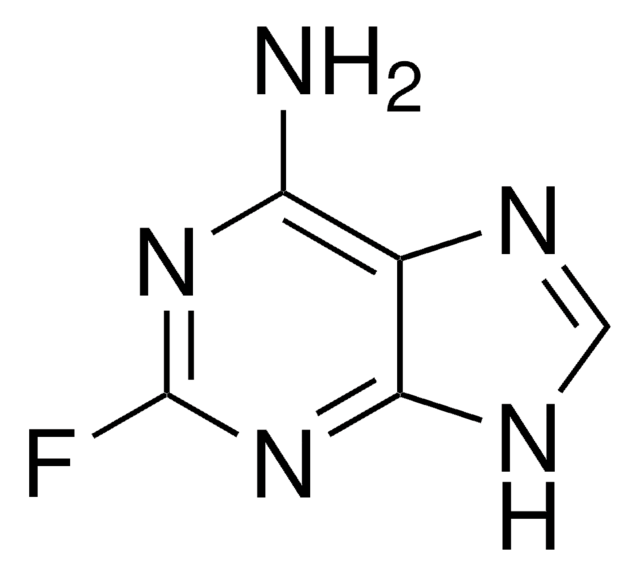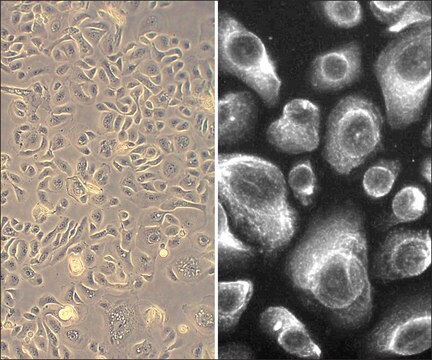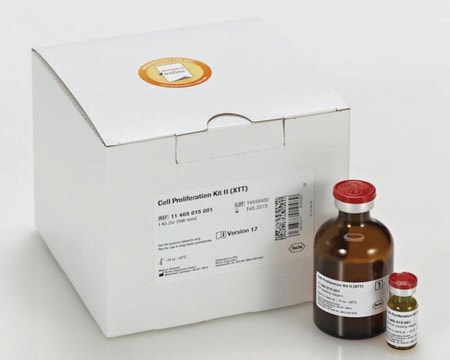推荐产品
产品名称
RPMI 7932 cell line,
生物源
human lung (effusion)
形狀
liquid
包裝
tube of 5 μg 94072246-DNA-5UG
pkg of vial of cells 94072246-1VL
增長模式
Adherent
染色體組型
Not specified
形態學
Epithelial-like
產品
Plasminogen activator
受體
Not specified
技術
cell culture | mammalian: suitable
相關疾病
cancer
細胞系來源
Human pleural effusion from a patient with malignant melanoma
細胞系描述
Derived from the pleural effusion of a 36 year old female with malignant melanoma. Cell line produces plasminogen activator. This cell line was found to be indistinguishable from cell lines COLO 699N & COLO 738 by STR PCR DNA profiling. At ECACC the STR PCR profile of all stocks of this cell line match the profile of the original source material received at ECACC. However, it is not clear if the cell lines COLO 699N, RPMI 7932 & COLO 738 were originally derived from the same individual as the profiles suggest. The cell lines COLO 699N, RPMI 7932 & COLO 738 were received from the same depositor. If we are able to obtain clarification of the relationship between these cell lines this information will be updated.
應用
Tumourigenicity studies
包裝
NOTE: Both the cell line and DNA from the cell line may be available for this product. Please choose -1VL or VIAL for cells, or -DNA-5UG for DNA.
培養基
RPMI 1640 + 2mM Glutamine + 10% Foetal Bovine Serum (FBS).
例行更新培養
Split sub-confluent cultures (70-80%) 1:2 to 1:4 i.e. seeding at 3-6x10,000 cells/cm2using 0.25% trypsin/EDTA; 5% CO2; 37°C.
其他說明
Additional freight & handling charges may be applicable for Asia-Pacific shipments. Please check with your local Customer Service representative for more information.
免責聲明
RESEARCH USE ONLY. This product is regulated in France when intended to be used for scientific purposes, including for import and export activities (Article L 1211-1 paragraph 2 of the Public Health Code). The purchaser (i.e. enduser) is required to obtain an import authorization from the France Ministry of Research referred in the Article L1245-5-1 II. of Public Health Code. By ordering this product, you are confirming that you have obtained the proper import authorization.
儲存類別代碼
10 - Combustible liquids
水污染物質分類(WGK)
WGK 3
閃點(°F)
Not applicable
閃點(°C)
Not applicable
B K Bhuyan et al.
Cancer research, 46(4 Pt 1), 1688-1693 (1986-04-01)
Our interest in prostaglandins (PGs) as antitumor agents stemmed from the report of Bregman and Meyskens (Cancer Res., 43: 1642-1645, 1983) that PGA1, PGA2, and PGD2 inhibited colony formation by human melanoma cells obtained from fresh biopsies of melanoma patients.
B Sharma
Cancer research, 37(12), 4660-4668 (1977-12-01)
Tumor cell fractions isolated from tumor lines SH-3 (breast carcinoma) and RPMI-7932 (malignant melanoma) by differential centrifugations were capable of transforming lymphocytes into cytotoxic effector cells. Lymphocytes cultured alone in human AB plasma did not become cytotoxic to tumor cells.
Generation of cytotoxic lymphocytes against human tumor cells in vitro by various soluble microbial extracts.
B Sharma et al.
Journal of the National Cancer Institute, 63(2), 341-346 (1979-08-01)
C W Porter et al.
Cancer research, 54(22), 5917-5924 (1994-11-15)
Certain N-alkylated analogues of the natural polyamine spermine, such as N1,N11-diethylnorspermine (DENSPM), rapidly deplete intracellular polyamine pools by down-regulating the biosynthetic enzymes, ornithine decarboxylase and S-adenosylmethionine decarboxylase, and by potently up-regulating the polyamine catabolizing enzyme, spermidine/spermine N1-acetyltransferase. On the basis
J A Eisman et al.
Cancer research, 47(1), 21-25 (1987-01-01)
It has been demonstrated previously that several human cancer cell lines possess specific, high affinity receptors for 1,25-dihydroxyvitamin D3 [1,25-(OH)2D3, calcitriol] and that 1,25-(OH)2D3 and certain of its metabolites inhibit the growth in vitro of several human breast cancer and
我们的科学家团队拥有各种研究领域经验,包括生命科学、材料科学、化学合成、色谱、分析及许多其他领域.
联系技术服务部门